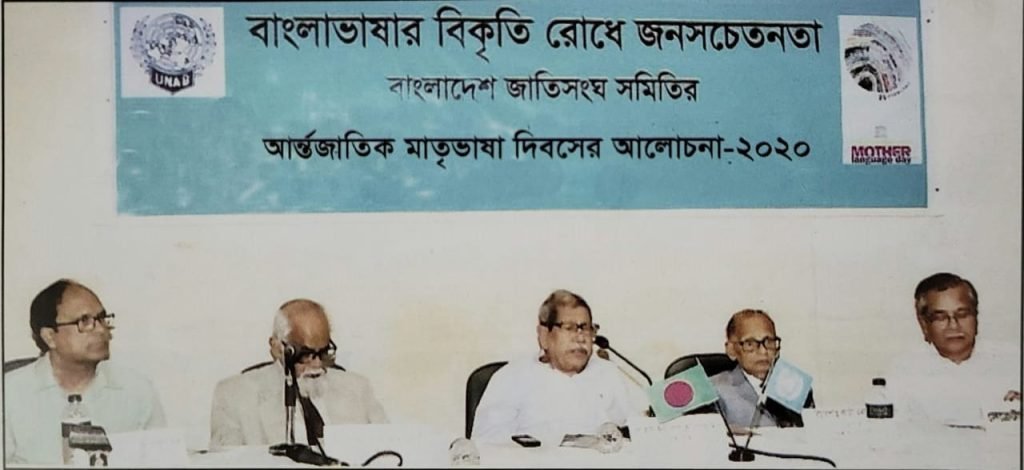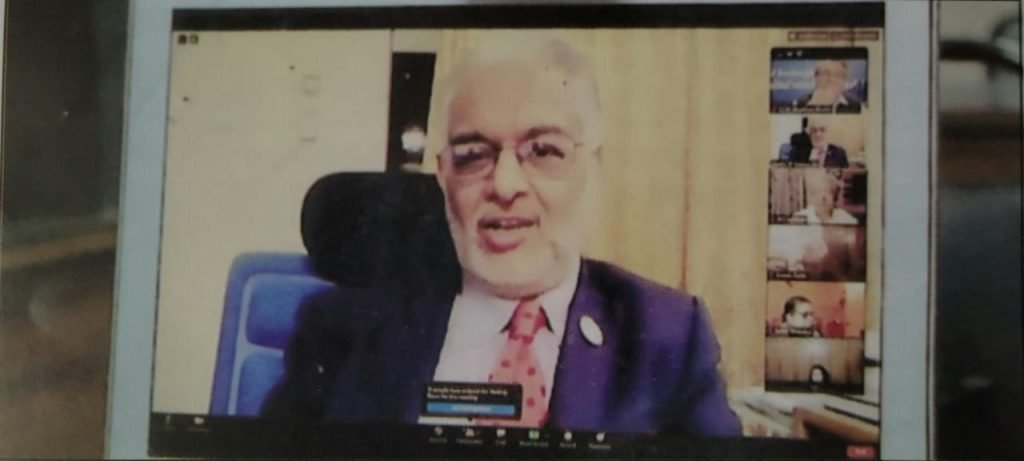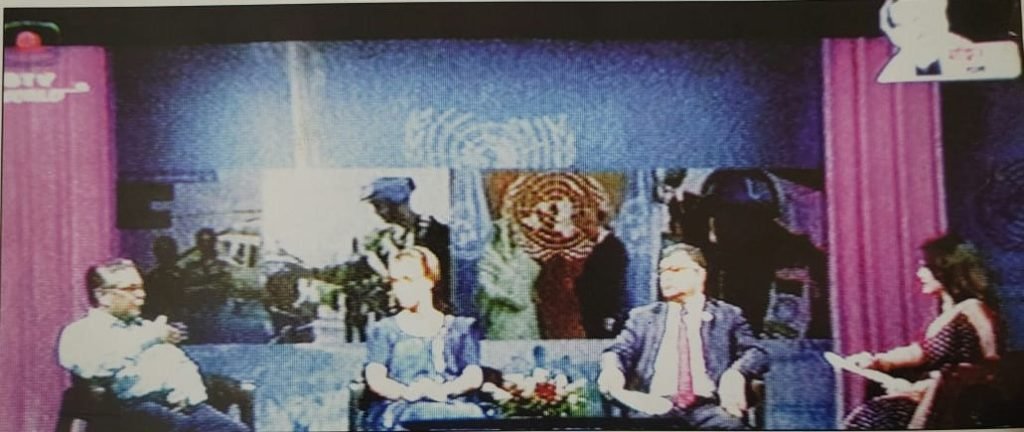HEADLINES
- UN Day observed
International Cooperation During Pendemic Essentially Failed - International Women's Day
Violence Against Women is Still a Social Pain - Mother Language Day
Steps Needed to Prevent Distortion of Bangla - Palestine Solidarity Day
The Palestine Crisis is a Stark Failure of the International Community - Human Rights Day
A Fine balance between respecting human rights and protecting health during Covid-19 should be ensured - New UNAB Publications

Dias of the International Mother Language Day. Sitting from left to right keynote speaker Dr. Syed Azizul Huq, Professor of Bengali, Dhaka University, Chief guest, noted vasha samgrami Dr.Jashim Uddin-Ahmed, the Chair National Professor Anisuzzaman, UNAB President Justice Kazi Ebadul Hoque and Secretary General Professor Syed Mohammad Shahed

Justice Muhammad Imman Ali, Judge of the Appellate Division, Bangladesh Supreme Court addressing webinar of Human Rights Day as Chief Guest

On the occasion of the United Nations Day-2020, Bangladesh Television (BTV) telecast a talk show. (From left to right) UNAB Secretary General Professor Syed Mohammad Shahed, UN Resident Coordinator in Bangladesh Ms.Mia Seppo, Bangladesh Foreign Secretary Mr. Masud Bin Momen and the anchor
UN Day observed
International Cooperation During Pendemic Essentially Failed
UNAB observed 75th UN Day through a virtual meeting on 24th October 2020 with its President Justice Kazi Ebadul Huq in the chair. Dr. Delowar Hossain, Professor of International Relations, University of Dhaka was the keynote speaker. Other distinguished speakers were senior diplomat Ambassador Dr. M. Afsarul Qader, Senior Assistant Secretary of the Ministry of Foreign Affairs Mr. Shoeb Abdullah and National Information Officer, UN information Center in Bangladesh Dr. Maniruzzaman.
The keynote speaker Dr. Delowar critically viewed UN and its 75 years of journey. He said, staying 75 years after birth means this World body carries importance. In 1974 in giving speech in Bangla at UN General Assembly, Father of the Nation Bangabandhu Sheikh Mujibur Rahman termed General Assembly as the “parliament of human race”. It is fact after World War II and till today UN has to wade so many challenges such as rise and spread of extreme nationalism, extremism, terrorism and era of cold war. World initiatives for cooperation experience a bleak scenario. At times bilateralism poses question and brings about unpleasant events. UN Secretary General said, pandemic is a test of International cooperation. But we essentially failed. All sorts of such trajectories are happened before UN. International cooperation could not reach the expected level. Even do not see international cooperation on Rohingya crisis going on satisfactorily. That means UN is proceeding through adverse environment.
But with all adversities, the very achievements of UN are remarkable. It has become a platform of international diplomacy. It has made us realize that we are part of human race and part of international community.
UN has no alternative and it is not competitive with states. Both are welcoming instruments for humanity. We are to know more about UN and its reform utterly needed for.
If we look at the gains of UN, we must see it from the perspective of its reform. It has become the platform of international diplomacy. It is its best success. As a student of International relations we don’t understand the concept of World, has there been no UN coming in sight in 1945. Not only does our perception go as being the member of UN. Consciously we take on the concept of being a part of Globe, part of global village. This idea is enshrined in human society due to UN activities. Multilateralism is another contribution of UN. It is the biggest and best form of diplomacy effectively taken in foreign policy by different countries like us. Though in many events, it proves faulty, yet so far international cooperation is concerned, we cannot brush it aside. UN teaches us so.
We see a big universal knowledge-hub given birth to and nourished by UN. We formed a global solidarity and whatever remnants it has, it is due to UN. It is its success.
Mr.Shoeb Abdullah of Foreign Ministry narrated the very birth of UN. He said UN was born for overseeing three principles. Those are upliftment of World peace, Development for all and Human rights. But sorry to say, all are in deficit of implementation.
UN has proved to be essential for human race. Multilateralism has not ceased to be relevant particularly is proved in the era of Covid-19. It is our new realization about UN that it is essential for mankind. It is more pertinent in “Mujib Barsha”, where we are observing the birth centenary of our Father of the Nation. It is now vow to all how to take forth UN next. The glorious journey of UN convinces us its importance.
Ambassador Dr. M. Afsarul Qader said apart from theoretical narratives, I used to say, UN is the place of origin of multilateralism. But after 75 years, it is now confronted with threat. How to get out of the impasse, is a task before the World people. In 1988 reforms of UN started. Proposal of reforms for Security Council was raised in 1988 by the then Secretary General. Like our Association, American United Nations Association prepared a long report on UN. I was then working in Bangladesh permanent mission in New York. But sorry to say all was in vain and it seems to be bleak in future also.
International Women’s Day
Violence Against Women is Still a Social Pain
On 10 March, 2020 UNAB observed International Women’s Day at BILIA with its Vice-President Begum Selina Khaleque in the chair. Here two keynote speakers presented their narratives. One was Dr. Azreen Karim, Research fellow, Bangladesh Institute of Development Studies (BIDS) on “Generation equality: Realizing Women’s Participation in Economic Development” and another Ms. Hasne Ara Begum, Gender Specialist, BRAC on” Ensure Women’s rights: build a just World”, respectively.
Dr. Azreen Karim said March 8 has been commemorated as the International Women’s Day which is the pivotal point in the women’s rights movement; raising attention to the mainstream issues of defining gender and empowerment towards labour force participation, sustainability, pay gap and most importantly, the recent addition in this. discussion i.e. undocumented labour (non- marketed services). The title of my presentation has also been in line with the Sustainable Development Goals (SDG) 5 which proclaims achievement of gender equality as a fundamental human right and opts for empowering all women and girls. According to the WEF gender gap report 2017, Bangladesh is ranked 47 leaving far behind its other South Asian counterparts; namely Maldives (106), India (108), Sri Lanka (109), Nepal (111), Bhutan (124) and Pakistan (143). An analysis of the average wage rates for daily labour delineates that both rural and urban female have made a massive improvement since the mid-1990s with urban male and female reaching almost a ratio of 1.6 percent in 2010. Average monthly earnings have been comparatively higher for males in all major sectors with a substantial improvement in the banking and insurance sector for the females in 2009-10. The average monthly income in the readymade garments (RMG) sector for females is comparatively lower than the male counterparts illustrating the stagnating gender wage gap argument much stronger in the industrial sector. More importantly, the argument of women’s unpaid work at home had become an emerging concern towards achieving gender equality goals.
To realize women’s participation in economic development, there is an absolute need to explore concrete methodology to measure women’s contribution in economic growth and development. As an applied development economist, I therefore put forth two proposals. The first one is to do empirical research to construct a woman empowerment in industry index (WEII). This could potentially use the well known Alkire Foster Method’ including five possible sub-domains: production, Resources, Income, Leadership and Time. Next, I propose my own version of achieving women’s economic rights to realize their participation in economic development: The 3w model of women welfare. The 3w model links women- wage- welfare in a distinctive format. In this model, I argue that empowerment of women could be socio-economically justified.
Another keynote presenter Hasne Ara Begum said during decade World has witnessed Women’s discernible empowerment in social, political and economic spheres. Their wide access to labour market is decreasing gender inequality in health and nourishment sectors. Progress of access to primary and secondary level of education is remarkable achievement of Bangladesh. It is possible because of appropriate policy pursuit and resource mobilization. According to World Economic Forum’s report 2020 on World gender inequality, Bangladesh topped the list among South Asian countries regarding achievement of male-female equality. Notwithstanding women are lagging behind in higher education, science and technology, in formal sectors, trade and business. Still women are the easy victim of abuses, child marriage, unprotected movement and lack of legal protection. These are the basic challenges Bangladesh is facing. Nearly 80% of women are somehow being tortured (BBS). In a BRAC study, 89% women are being violated and 85% of them by their near and dear ones or in

